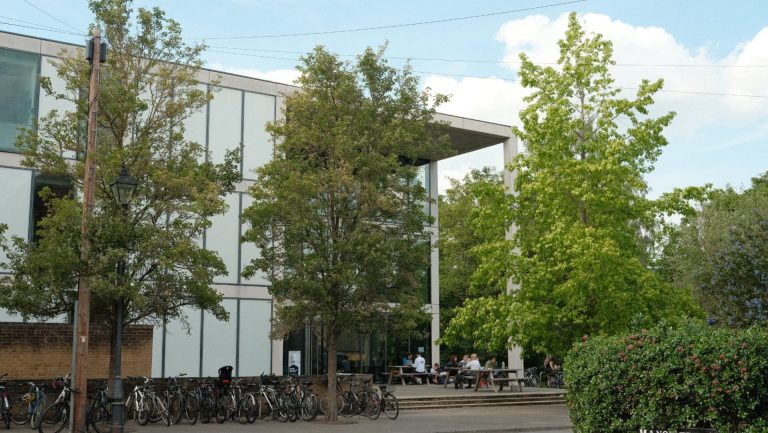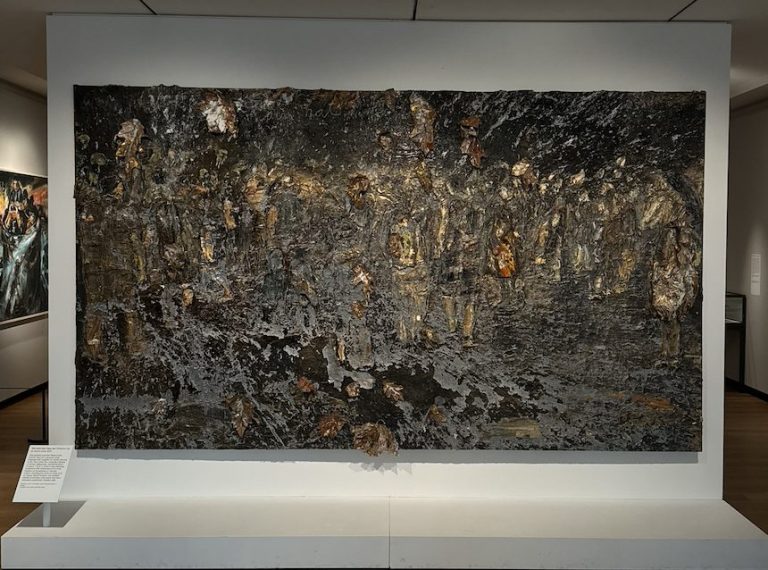Fiddler on the Roof has been performed thousands of times since its 1964 opening, and, courtesy of The Eglesfield Musical Society, has now been performed four more times in a garden of The Queen’s College. While its first night was not without its issues on both the technical and musical sides, it was truly a delight to listen to and watch.
Competing for my attention with the Fellow’s Garden, which lay immersed in a golden sunset and backdropped by an ornate 17th-century library, the cast entered and quickly won me over with their shamelessly danceable rendition of ‘Prologue: Tradition’. While the central character Tevye (Jacob Ostfeld) set the scene alone on stage, he was accompanied by the violinist Isabel Lesser playing the title character in a first floor window off to the right, who would later join the rest of the cast as they paraded into the first musical number.
The on-stage musical soloists were well chosen. The aforementioned fiddler punctuated the narrative with smooth performances that did not waver regardless of her movement around or proximity to the stage and orchestra, and provided a sombre mood to the beginning and end of the musical. Her placement off-stage up in the window was a nice touch; I take it that the roof was out of the question.
The clarinettist Matthew Rogers was fantastic and deserves special mention here, since the title gives them no credit. Standing stage right with one foot planted proudly on a chair, they played skilful melodies as well as shorter runs over the more energetic numbers with so much charisma that they have become a contender for my favourite character. Despite being quite far from the stage-facing screen which displayed the conductor live, their playing remained in time with the rest of the ensemble. They even joined in on the action during the wedding scene, giving out silver plates and exaggeratedly crying during the speeches, which gave me a giggle.
The rest of the orchestra was generally strong, the brass and woodwind sections warranting mention for their pretty flawless accompaniment. The higher and lower strings occasionally seemed a little out of time with each other, but the percussion section especially could use practice. The snare was noticeably untethered to the beat, causing a few head turns. This problem was at its worst during ‘To Life’ – a raucous, joyful, high tempo song set in a bar celebrating Lazar’s engagement (played by Charlie Bach). As the townsfolk united in dance, all attention should have been on the choreography and the bouncy upbeats, which the snare should have emphasised, but it was unavoidably distracting as the punch of the drum missed the beat and instead hit the audience around the ear. In addition, there were a couple of comically incongruent triangle hits during the play’s regular dialogue. Overall, though, the instruments were played very accurately, capturing the music’s folk roots and coping well with tempo changes (aside from their less-than-perfect return after the intermission with ‘Entr’acte’, which evoked the atmosphere of a haunted circus).
Among the cast, there wasn’t a single weak voice. They suited styles ranging from genre-typical musical theatre singing to more choral pieces like ‘Sunrise, Sunset’. Harmonising beautifully, every singer worked well in tandem with the others, with some extravagant vibrato thrown in too. All of this was while jumping around, running, and dancing, which somehow didn’t leave them out of breath.
The choreography, arranged by Magdalena Lacey-Hughes, was very fun, with plenty of bouncing and amusing prop usage. While this sometimes brought its own complications, the actors carried on without issue. During ‘Matchmaker, Matchmaker’, for example, three of the sisters (Sydney Haskins, Emma Leibowitz, and Nicole Palka) pass their mops to one another. One missed a throw to the second, but the third caught it and passed it along without missing a beat. When doing the same dance, the actors were often a little out of sync, with one or two starting or ending late or early.
By that same token, however, the cast really came to life when they were let off their leash and set free to each dance or act individually as part of a crowd. It genuinely felt alive when the stage was filled with a backdrop of many people conversing, working, or dancing in their little groups. This was especially true during the unforgettable wedding scene, when the crowd joined in with their clapping and cheering. Some people were forced to join in, picked from the crowd for short dances, which they seemed to enjoy – a cruel way to make me sweat anxiously at the thought of participation. The actors always looked like they had something to do and worked engagingly with physicality, for which I commend them as well as the director, Hannah Davis, and assistant director, Phoenix Barnett.
Jacob Ostfeld and Anneka Vetter gave outstanding performances as Tevye and the Matchmaker Yente respectively, both charming the crowd with melodramatic line deliveries, large movements, and exaggerated expressions. It was a shame to see so little of Vetter. Despite having had little time on stage, her characterful way of speaking and gesticulating at one point earned her a mid-scene applause break as she exited. Ostfeld was brilliant, his performance impressive with its range. He played moments of seriousness with the soberness they deserve and moments of pantomime-like cheese without ever being too hammy. As he stomped onto stage the first time with his cart, I could feel his steps through the dirt. A memorable moment of skill came when he skipped a verse of ‘If I Were a Rich Man’, quickly apologised in-character, and jumped back in so flawlessly in coordination with the orchestra, who also took it in their stride, that I honestly wasn’t sure if that was part of the song.
The costumes were a muted rainbow of earthy reds, browns, and greens, all in-keeping with the setting. Constrained by the historic garden, the production managed to integrate itself neatly into the space, with three islands of raised staging separated by the ground (designed by Kathrine Surgay). Seating was split down the middle, allowing actors to come by and drag the audience into the story. During ‘Tevye’s Dream’, the bed was not placed on the stage, but on the ground, leaving many viewers to watch the backs of people’s heads, rather than the sleepy couple. However, it’s fair that they didn’t want to lift it all the way up, and I had a great time admiring the haircut of the person in front of me anyway. The lighting was utilised well to portray warmth or a lack thereof (designed by Felix Gibbons), but the slow spotlights occasionally left characters speaking in the dark.
The sound system left something to be desired. The microphones were necessary, ensuring that the voices of the actors, the music of the orchestra (sat far in the back), and the playing of the violinist (in the window) would not be lost in the open air, but they picked up a lot of breathing, wind, and page turning. In Act 2, an infrequent chirp would play over the speakers during musical numbers. Everyone did an admirable job of continuing through these interruptions, as well as those caused by proximity to High Street. The noise of reversing vehicles and the emergency services did not interrupt their depiction of early 19th century Imperial Russia.
I loved this production. Supported by a brilliant cast, a generally excellent orchestra, a great creative team, and a dedicated crew, it was a standout evening. While there were some hiccups, those can be forgiven as opening night woes. Enveloped by the music and a warm coat, I found myself immersed in The Eglesfield Musical Society’s commendable production.










